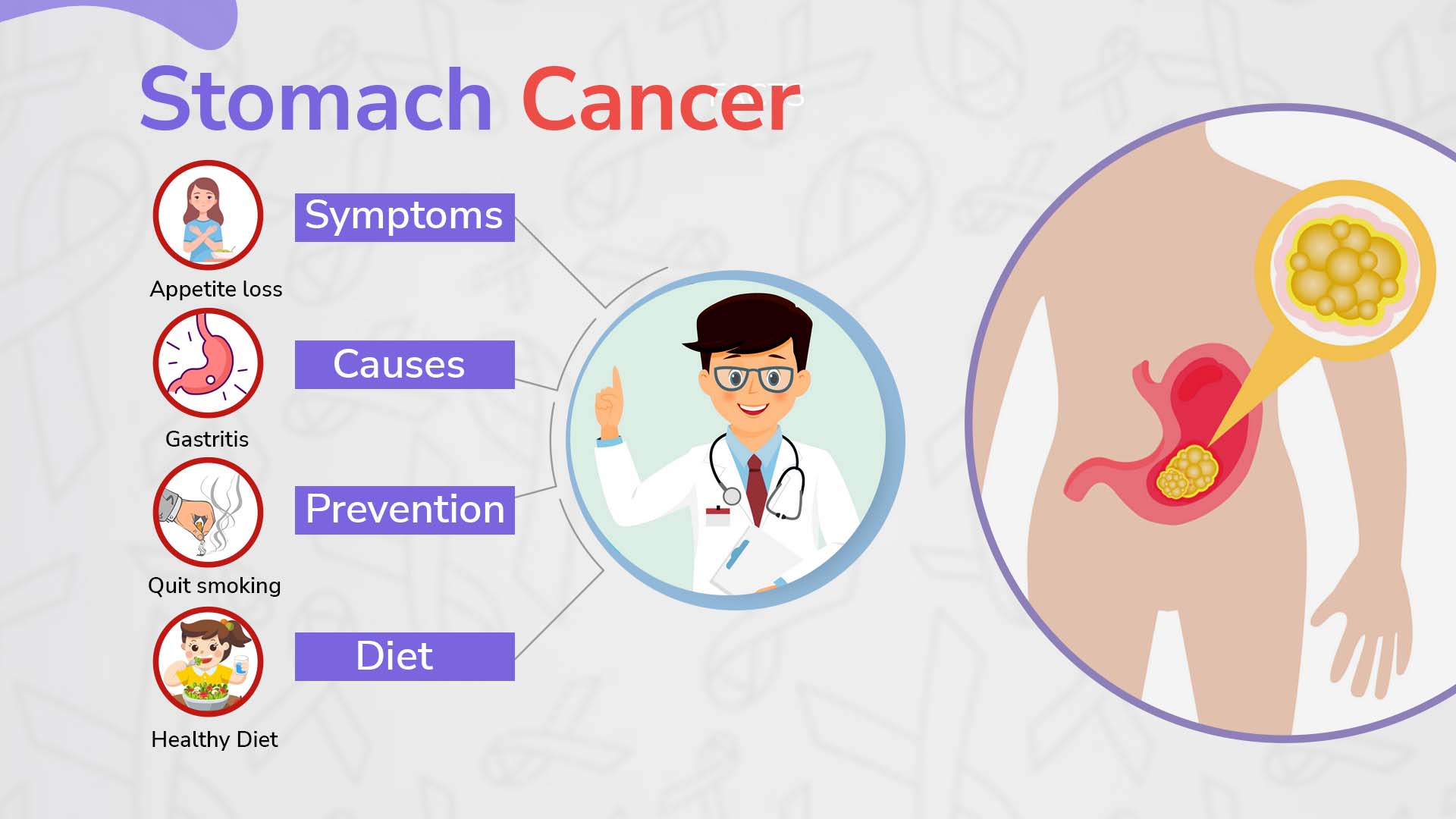Blog
What is stomach cancer? | Symptoms, Causes, Diet

Stomach cancer, also known as gastric cancer, is a type of cancer that begins in the stomach. The stomach is located in the upper center of the abdomen, right below the ribs. The stomach aids in the breakdown and digestion of meals.
Stomach cancer can occur anywhere in the stomach. Approximately 95% of the time, stomach cancer begins in the lining of your stomach and grows slowly. If left untreated, it can grow into a mass (tumour) and penetrate deeper into your stomach walls. The tumour could spread to adjacent organs such as your liver or pancreas.
How it begins, the causes, symptoms and diet is all we’ll cover in this article.
The Stomach
Understanding stomach cancer requires knowledge of the stomach's normal structure and function.
The stomach is a sac-like organ that plays a vital role in digestion. After chewing and swallowing, food enters the oesophagus, a tube that transports food from the throat and chest to the stomach. The gastroesophageal (GE) junction connects the oesophagus to the stomach right beneath the diaphragm (the thin sheet of breathing muscle under the lungs). The stomach next begins digestion by secreting gastric juice. The food and gastric juice are combined and then discharged into the duodenum, the first section of the small intestine.
Some individuals refer to the belly area as the stomach. The abdomen is the medical word for this area. For example, some persons with discomfort in this area may say they have a "stomach ache." Because the stomach is only one of numerous organs in the belly, doctors would refer to this condition as "abdominal discomfort."
Now the question is, what causes stomach cancer and how it develops?
Development of stomach cancer
Stomach cancers usually develop over time. Pre-cancerous changes in the stomach's inner lining (mucosa) are common before the development of cancer. Because these early changes rarely create symptoms, they go undiscovered.
Cancers that begin in different parts of the stomach can generate a variety of symptoms and have varying results. The location of the cancer might also influence therapy options. Cancers that begin or spread to the GE junction, for example, are often staged and treated the same way as cancers of the oesophagus.
Signs of Stomach Cancer
Symptoms of stomach cancer are rare in the early stages. Even the most common early indicators of stomach cancer, such as unexplained weight loss and stomach pain, don't usually appear until cancer has progressed.
Among the symptoms of stomach cancer are:
- Appetite loss.
- Having difficulty swallowing.
- Weakness or fatigue
- Vomiting and nausea
- Unknown cause of weight reduction.
- Indigestion and heartburn
- Vomiting blood or black stool (poop).
- After-meal bloating or gassiness
- Stomach ache, usually above the belly button
- Even after a short meal or snack, you feel full.
Many of these symptoms are also seen in other illnesses. Consult your doctor to see if your symptoms are indicative of stomach cancer or another disease.
What causes the development of Stomach cancer?
Certain factors appear to raise the risk of stomach cancer. They are as follows:
1) There is a family history of stomach cancer.
2) Infection with Helicobacter pylori (H. pylori).
3) Gastroesophageal reflux disease (GERD) (GERD).
4) Gastritis.
5) Infection with the Epstein-Barr virus.
6) A history of stomach ulcers or polyps.
7) A high-fat, salty, smoked, or pickled diet.
8) A diet that is deficient in fruits and vegetables.
9) Frequent contact with things such as coal, metal, and rubber.
10) Tobacco use, whether smoking, vaping, or chewing.
11) Excessive alcohol consumption.
12) Obesity.
13) Atrophic gastritis caused by autoimmunity.
Researchers aren't clear why stomach cancer is more common in those with Type A blood.
Types of Stomach Cancer
There are mainly four types of stomach cancer. They are as follows:
a) Adenocarcinoma: Adenocarcinoma stomach cancer begins in mucus-producing cells. This form of stomach cancer is the most common. Adenocarcinoma stomach cancers account for nearly all malignancies that begin in the stomach.
b) Gastrointestinal stromal tumours (GIST): GIST begins in specific nerve cells present in the stomach and other digestive organs. GIST is a kind of soft tissue sarcoma.
c) Tumors that are carcinoid: Carcinoid tumours are neuroendocrine malignancies that begin in the cells. Neuroendocrine cells can be found throughout the body. They perform some nerve cell functions as well as some of the activity of cells that produce hormones. Carcinoid tumours are neuroendocrine tumours.
d) Lymphoma: Lymphoma is a type of cancer that begins in immune system cells. The immune system of the body fights pathogens. Lymphoma can begin in the stomach if the body sends immune system cells there. This could occur if the body is attempting to fight off an illness. Non-lymphoma Hodgkin's is the most common type of lymphoma that begins in the stomach.
Prevention of Stomach Cancer
Though cancer is a disease that cannot be predicted, you can still take care of the following:
1) Consume an abundance of fruits and vegetables. Every day, try to include fruits and vegetables in your diet. Choose a range of brightly coloured fruits and veggies.
2) Reduce your intake of salty and smoked foods. Limit these foods to protect your tummy.
3) Quit smoking. Quit smoking if you smoke. Don't start smoking if you don't already. Smoking raises your chances of developing stomach cancer as well as many other types of cancer. Quitting smoking might be difficult, so seek advice from your doctor.
4) Inform your doctor if stomach cancer runs in your family. People with a strong family history of stomach cancer may be screened for the disease. Screening tests can detect stomach cancer before symptoms appear.
Conclusion
Stomach cancer is not usually avoidable, although it may be treated if detected early. Depending on your cancer diagnosis, your physician may recommend surgery to remove cancer cells or tumours. They may recommend a combination of treatments that can destroy or shrink cancer cells. Finally, your prognosis is determined by many factors that you can discuss with your provider. Do not be afraid to inquire about treatment alternatives, including their benefits and hazards. Seek advice from your healthcare experts about what your cancer diagnosis means for you.
